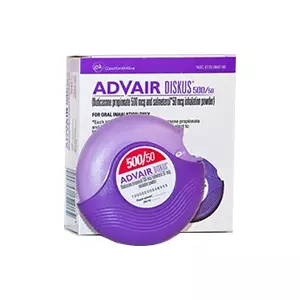Asthma Medication for Treating Asthma Attacks Symptoms
Asthma is one of the inflammatory diseases of the air passages in the lungs. It is one of the types of Chronic Obstructive Pulmonary Diseases (COPDs). This respiratory condition makes breathing difficult, affecting the quality of life. More than 25 million Americans suffer from asthma, according to the U.S. Centers for Disease Control and Prevention (CDC). At least 1 out of every 12 American children has asthma.
Asthma occurs when the air passages or airways in the lungs swell and the muscles around them get stiff. When this happens, mucus fills the air passages, reducing the airflow in the lungs and resulting in symptoms such as coughing, wheezing, shortness of breath, and chest tightness. Other symptoms of asthma may include difficulty talking, fatigue, and anxiousness or panic. Some people may have an asthma attack during a workout, the condition called exercise-induced asthma.
Not all patients with asthma will experience these symptoms. You must see a doctor if you think the symptoms you are experiencing could be an indication of asthma. Although incurable, asthma is a treatable condition. It can be prevented and treated with effective medications available in oral pills and inhalers. An asthma attack can be prevented using daily steroid inhalers; it can be treated with rescue inhalers.
Fast Facts about Asthma
- Each year, over 3,500 people die of asthma in the United States, of which half of them are aged 65 and above.
- Statistics have shown 50% of people with asthma experience at least one asthma attack every year, with children more likely to have it than adults.
- Asthma attacks can be triggered by exposure to allergens, such as pollen, dust, animal dander, pollutants, irritants, strong odor, or extreme weather conditions.
- The most effective medication for treating and preventing asthma is inhaled steroids that act by reducing the inflammation.
- Often considered a hereditary disorder, asthma is responsible for 439,000 hospitalizations and 1.3 million ER visits yearly.
Types of Asthma
The most common type of asthma is bronchial asthma, affecting the bronchi (airways) in the lungs. Childhood asthma and adult-onset asthma are other common types of asthma. Adult-onset asthma is characterized by the occurrence of symptoms after 20 years of age. Other types of asthma include:
Allergic Asthma: Allergens that trigger this type of asthma include animal dander, certain foods, mold, pollen, and dust. Allergic asthma can be seasonal because it is often associated with seasonal allergies.
Non-allergic asthma: In this type of asthma, irritants such as cigarette smoke, cold air, burning wood, air pollution, air fresheners, and certain viruses trigger an asthma attack.
Occupational asthma: It is a type of asthma that is induced by triggers at the workplace, such as dust, dyes, gases and fumes, chemicals, animal proteins, and rubber latex.
Exercise-Induced Bronchoconstriction (EIB): Some people experience asthma during exercise because, in them, physical activity causes spasmodic contraction of the bronchus. EIB was initially called exercise-induced asthma (EIA).
Nocturnal asthma: A person experiences asthma symptoms at night. Triggers include heartburn, dust, or pet dander.
Diagnosis of Asthma
There is no single diagnostic test to determine when you have asthma. Your doctor will use various criteria to understand the symptoms you have are actually the result of asthma. Experts will ask you about your family history to understand whether your asthma is due to genetic predisposition.
Upon physical exam, your doctor will listen to your breathing using a stethoscope. Wheezing is one of the characteristic findings of asthma. A skin test is also advised to look for any signs of allergic asthma. Breathing tests, such as pulmonary function tests (PFTs), help in measuring airflow in and out of your lungs. Spirometry is another breathing test that measures the speed of the air.
Treatments of Asthma
Usually, asthma treatments fall into three categories – breathing exercises, quick-acting treatments, and long-term asthma control treatments. Doctors recommend one treatment or a combination of treatments considering your type of asthma, age, and triggers.
Breathing exercises have been found helpful at increasing lung capacity and cutting down on asthma symptoms. Your physician can help you learn how to do breathing exercises specifically designed for asthmatic patients.
Quick-relief asthma treatments include medications that are to be used in case of an asthma attack occurs. Rescue inhalers containing steroids provide quick relief to help regain your breathing. You are advised to seek medical help if you frequently need to use rescue inhalers; you may need a long-term solution.
Bronchodilators are medications that work within a few minutes. They relax the tightened muscles around your air passages. Bronchodilators are taken in the form of the inhaler (rescue) or nebulizer.
Long-term asthma control drugs include medications that are to be used daily. Daily asthma inhalers contain steroids that help reduce the number and complexity of asthma. However, they do not control an immediate asthma attack. Long-term asthma control drugs include Anti-inflammatory drugs, corticosteroids, anticholinergics, and long-acting bronchodilators.
Prevention of Asthma
Sometimes, it could be challenging to prevent asthma because doctors have to identify exactly what is causing your asthma. However, preventive strategies for asthma attacks include avoiding triggers or staying away from factors that cause asthma. Reduce exposure to allergens, such as dust, mold, pollen, etc. Make sure you get allergy shots because allergies can cause asthma. Keep your rescue inhaler always with. Your physical will put you on an asthma action plan so you can prevent an attack.
An allergist or immunologist is the best physician when it comes to diagnosing and treating asthma. You can take control of your condition by regularly checking with your allergist.


